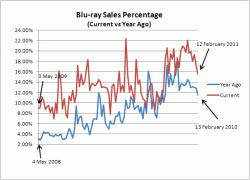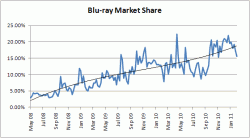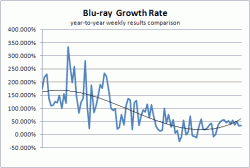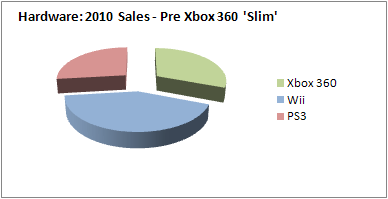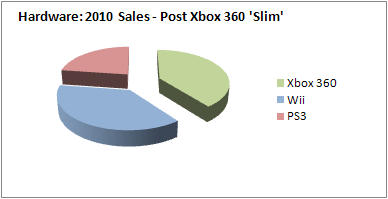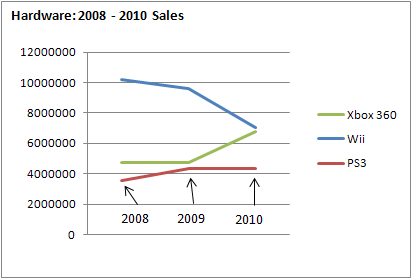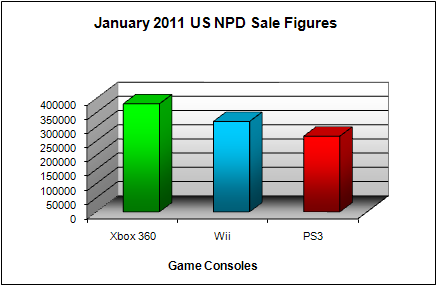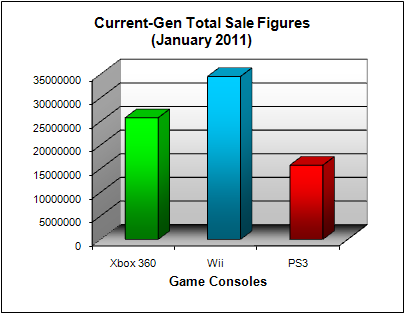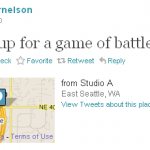The last week of the “high maintenance” month of February is upon us, and it’s a relatively quiet one in terms of news stories (quantity wise, anyway). I did finally write that US video game sales 2010 year-in-review blog that I promised over a month ago. And it was pretty short as promised as well, mainly thanks to NPD no longer releasing publicly all the figures needed to do a proper analysis. But really, the story of 2010 was the Xbox 360 revival (not that it was ever close to dying or anything), with the last of the three graphs I posted in the review blog being the most telling, showing the trend of the three major home-based consoles. Anyway, onto the news roundup.
 In copyright news, let’s start with more bad news for isoHunt. Not only did they get sued again last week, now, even a potential ally in Google has come out blasting the BitTorrent search engine.
In copyright news, let’s start with more bad news for isoHunt. Not only did they get sued again last week, now, even a potential ally in Google has come out blasting the BitTorrent search engine.
Now, on first glance, you might expect Google to back isoHunt, considering both are search engines. And since Google is fighting its own copyright battle against Viacom, surely this puts them on the same side as isoHunt. But that’s not really the case. Viacom’s strategy in their appeal of the YouTube verdict is to say that it’s no longer enough for websites to be DMCA compliant, that is to remove infringing content when requested. Instead, Viacom says that there is something called “red flag” infringement, which means that if it’s somewhat obvious that infringement is occurring, then Google/YouTube should take action even without any specific DMCA complaints. The problem for Google in regards to the isoHunt appeal is that the MPAA might just win the case against isoHunt on the basis of “red flag” infringement, and it would set a precedent that would disadvantage Google. So what’s Google’s legal strategy? It’s to paint isoHunt not as a search engine, but just a really really bad copyright infringer. It’s arguing that there’s no need for the MPAA to even use “red flag” infringement, because isoHunt is plainly guilty of actively and deliberately supporting piracy, something that Google/YouTube cannot be accused of. Yes, it really hurts isoHunt’s defence that they’re just a search engine, like Google, but this is Google in self-protection mode.
Regardless, “red flag” infringement is actually quite a dangerous precedent to set, so I do support Google’s efforts in trying to fight against it, even if it means that isoHunt will be sacrificed as a result. The problem with “red flag” infringement is that it potentially could kill innovation on the Internet, because let’s admit it, a lot of even today’s most popular and mainstream web services had to tolerate or even support “red flag” infringement, to get their business up and running. Would YouTube exist today if people weren’t allowed to upload copyrighted content back when it first started out? Would Google, the search engine, have become the most popular search engine if it blocked all piracy related search results when it was first launched? Would any of the free file hosting websites even exist, allowing us to share large (legal) files that otherwise would be too big for email? “Red flag” infringement is basically the content owner’s way of stopping all innovation, even if there is a remote chance that infringement could occur at some unspecified time in the present or future, and that’s dangerous. And it also puts the onus on identifying infringing activity on the side of the website publishers, as opposed to the content owners, which doesn’t even make sense, since how would I know what content belonged to whom and whether it’s really authorized or not (case in point, Viacom’s own employees uploading copyrighted clips under fake accounts, to create fake hype and promote their shows)?
And so we move on to the next set of news, which is also about appeals. This time, it’s the Australian Federation Against Copyright Theft’s (AFACT) appeal of a verdict from a year ago which found Internet Service Provider, iiNet, not guilty of authorizing copyright infringement committed by its subscribers, even though iiNet failed to act on infringement notices sent by the AFACT. The result of the appeal was announced this week, and it’s victory again for iiNet, even if it’s mostly symbolic at this point. While iiNet won the appeal, several decision has been overturned in favour of the AFACT, and it probably paves the way for AFACT stepping up its campaign to make ISPs the copyright police. iiNet’s victory apparently was more due to technical reasons, the precise design of the copyright infringement notices which the court found inadequate, and really, the decision probably gives the AFACT a very clear set of guidelines on just how to send infringement notices to ISPs. Basically, a symbolic victory for iiNet, but probably a more substantial win for the AFACT in the long run.
What frustrates me most about these types of trials, and about ISP warnings and/or three-strikes system, is that, in the end, it will be so so easy for users to bypass monitoring and escape being caught, or even cautioned. This is because anti-piracy monitoring today is basically just based on monitoring BitTorrent networks, which is only one way to obtain pirated content. Encryption, VPNs, or even just direct Internet downloads via digital lockers, can all escape the watching eyes of the piracy police, and so with millions of dollars being spent on lawsuits, and even more millions per year for monitoring and policing, the result will, as always, just push people towards using new piracy tools that will make online piracy harder and harder to track and stop. Remember in the good old days when websites simply hosted the pirated files, and how easy that was to stop compared to stopping torrents? Civil liberties are being sacrificed to give corporations a *false* sense of security, and that’s a really really bad reason to force us to give up our rights (is there even such a thing as a “good reason”?)

Again, not much happening for HD/3D news, and I’m not even going to mention the stupid “Inception to be converted to 3D” news, because if there’s one thing worse than the 3D hype, then it’s “taking a 2D movie and converting it to fake 3D so we can squeeze more money out of the fans” phenomenon. Note to studios: not everything has to be in 3D!
While not exactly HD news, exactly, but a new version of Xvid has been released, version 1.3.0, and it’s the first new version in quite a while. MPEG-4 ASP based codecs may no longer be as sexy or “cool” as the MPEG-4 AVC/H.264 ones, but there’s still a place for the good old Xvid codec for medium quality video files.
And the absence of real news means that I will have to plug my weekly US Blu-ray (and DVD) sales analysis feature, the latest analysis found here. It’s a place where Blu-ray fans can go to bask in the glory of “their” format’s sales successes, and where die hard HD DVD fans like myself can go and find any signs that show Blu-ray’s weakening stance, no matter how statistically insignificant (“OMG, Blu-ray sales fell 20% compared to last week – it’s doooomed!!”).
And as part of compiling the stats, I also regularly update a series of related graphs, that are never actually posted anywhere (other than on our on-and-off “Blu-ray: The State of Play” feature). So instead, I’ll post some of the graphs here right now, for your enjoyment.
Every week, there are stats to show how Blu-ray revenue as a percentage of combined disc (Blu-ray + DVD) revenue, and here’s the stats plotted that compare the most recent weeks (in red) to the same week a year ago (blue):
The graph below shows the same stat as above, except plotted in a linear time fashion, with a trend line showing Blu-ray’s growth.
And finally, this graph shows the Blu-ray growth rate (so if Blu-ray’s market share was 5% a year ago, and now it’s 10%, the the growth rate is 100%, or doubled), again with a trend line.
![]()
And finally in gaming, which these days, should probably be renamed to the “PS3 Jailbreak” section instead. Last week ended with Sony banning a bunch of users from PSN for using hacked firmware, and now the hackers have fought back by hacking PSN to un-ban themselves, as well as make it possible to ban anyone they want.
Note to Sony: don’t try to out-hack hackers.
Then we had the news of Sony attempting to bring out a new PS3 SKU that would be hack proof (famous last words). geohot and others have already said that the only way for Sony to really combat the PS3 hack is to release a new hardware, and it seems Sony has taken their advice. At the same time, Sony is beefing up their own legal team as they seek to sue their way out of this mess (what could possibly go wrong?). Sony have also got the German police to raid the home of PS3 Linux hacker graf_chokolo, which will please the Linux/hacking community. You can read more on these stories here.
For those that think I’ve been too hard on Sony, perhaps you’re right. Personal history with the company aside, the main reason I and a lot of people detest Sony is solely based on their recent actions, best described in this Make article/rant. I started Digital Digest talking about how to play DVDs in Windows, back when commercial solutions were few and far in between, and with Pentium 4’s still an expensive early-adopter thing, you just needed to hack your way to play DVDs on PCs smoothly, from tweaking drivers to using custom decoders and more. And from then on, it’s always been about using products and software beyond the purposes intended by manufacturers and publishers. Sony’s hatred towards anyone that wants to do things outside of Sony’s own limited imagination, and their arrogance of forcing people to use Sony products in Sony’s own prescribed manner (and it’s not just end users, it’s also developers too, having to adapt themselves to Sony’s way of doing things, as opposed to the other way around – a philosophy that Microsoft, for example, do not share, which is why the Xbox 360 is a much more developer friendly platform). And it’s also the arrogance in their response, which is almost always an overreaction (eg. CD root-kit fiasco), because it’s as if they believe that using, developing for or even selling a Sony product is a privilege, and so if you make Sony angry, expect retribution. Point out a flaw in their security design? Sony will get you. Make their products do more than advertised? Sony will get you. Sell products to help Sony users in a way Sony doesn’t like? Sony will double get you (as geohot wisely raps in his video, “I shed a tear everytime I think of Lik Sang”).
Speaking of Microsoft as a “good guy” when it comes to consumer right seems quite wrong to me, but compared to Sony, there are a lot of “good guys”. But Microsoft’s response to the Kinect hacks (not the first response, which was similar to Sony’s, but the subsequent responses by openly welcoming the hacks) is to be commended, and really, it’s the best business decision as well (Sony’s actions have often hurt themselves more than anyone else, to be fair). And now Microsoft is following up by releasing an official PC developer kit for Kinect, available for free to non commercial users and researchers. Of course, opening up the development of an console accessory is different to the reaction of seeing your product hacked into oblivion, but still, it’s hard to imagine Sony reacting to the hack in the same manner (as the Make article mentioned, the Aibo hacking incident kind of shows what a typical Sony response might have been).
Also, Kinect will work with Windows Phone sometime in the future (not this year though), which given the recent Nokia announcement regarding moving to the Windows Phone platform, can only be a good thing for Kinect. Still, Kinect needs some better, more varied games, because frankly, I’m a bit tired (in both sense of the word) from playing Kinect Sports soccer and winning 4-3 all the time (I’m not that good at goalkeeping, which for me, consists of flapping my arms wildly).
Alright, enough ranting for this week. Have a good one.



